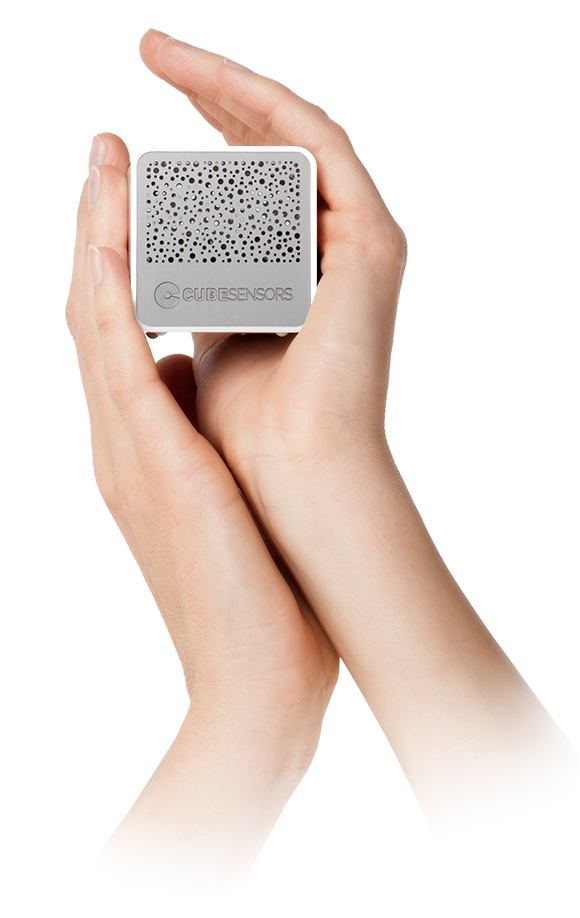April 22 is better known around the world as Earth Day. This is the time of the year when we talk about walking, cycling or taking a bus to work (that’s how the CubeSensors team gets to the office most days) and recycling. But it’s also important to remember that caring for our planet begins in our homes and offices.
That’s why we decided to celebrate this year’s Earth Day with five indoor living tips that will not only help you become more environmentally friendly, but also keep you, your family and coworkers healthy, productive and happy.
1) Check for unused chemicals lying around
Now would be a good time to check if you’ve got any opened old or unused chemicals such as paints lying around and emitting harmful Volatile Organic Compounds (VOCs) into your living or working spaces. Don’t go by smell alone, check the labels. Dispose of them safely according to instructions. Next time, try to buy only the amount you know you’ll need to get the job done or find natural substitutes whenever possible.
2) Go green when cleaning
Cleaning products are another common source of harmful VOCs. A more environmentally and health friendly way to tackle cleaning is to use natural cleaners. Vinegar, baking soda, lemon juice and some other unexpected ingredients can work wonders on any types of surfaces with the right green cleaning recipes.
3) Want fresh air? Open the windows!
Don’t trust fresh air that sells in a bottle! The best way to get fresh air into your home or office is to open your windows. If it’s too cold or hot outside, or if you’re suffering from hay fever, you can try natural air fresheners, such as vodka, coffee grounds and lemon. In summer, remember to take advantage of cool early mornings or fresh evening and night air. Also, don’t forget to take out the garbage, especially organic, frequently. Removing the source of bed smells works better than masking it!
4) Don’t overdo the air conditioning or heating
It’s tempting to keep the office super cool during summer or our homes cozy warm during winter, isn’t it? It can also be quite costly. You probably already know that air conditioning and heating consume a lot of energy, which can work against both our planet and our wallets. But there might also be a productivity cost. Studies suggest the sweet spot for optimal performance is somewhere between 70° F (21° C) and 77° F (25° C). Keep that in mind when reaching for the thermostat!
5) Remember to turn the lights off when not needed
While having good lightning is important for productivity and comfort, there really is not need to keep all your rooms well-lit when you’re not using them. You will save a lot on your electricity bill. And while we’re at it, try to move your working space to a spot with natural lightning, and you’ll also feel happier and more productive on sunny days.
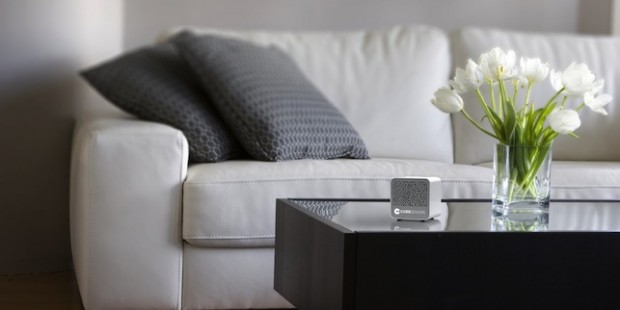
Nothing too complicated, right? The usual excuse is that we just don’t have the time to think about all these little things. And that’s exactly why we’re so passionate about building CubeSensors. With a non intrusive Cube that measures temperature, humidity, noise, light, air quality and barometric pressure in every room, we’ll help you keep an eye on important changes in your environment. And the Cubes will make sure to remind you of those little, yet important actions you can take that might end up saving you money, keep you healthier, and even protect the environment.
If you’re subscribed to our newsletter or are following us on Twitter and Facebook, you might have already heard the big news: we have officially sold out the first batch of CubeSensors that will be shipping this Summer! We are really grateful for all the support and interest in the Cubes and are working hard at shaping the Cubes into good looking and smart companions that will improve your indoor living.
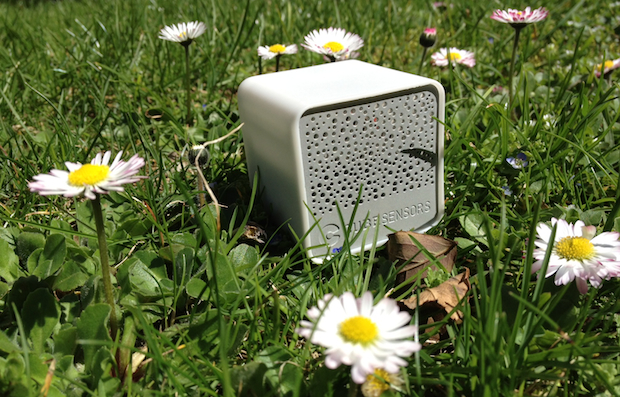
Don’t worry if you haven’t yet managed to order your pack or would like to order an extra one . We are now taking orders for the second CubeSensors batch that will be shipping in Autumn. You can still make your reservation today with just $10. We’ll only ask you to pay the rest when your Cubes are ready to move in with you. The only difference is that the reservation is now non-refundable. Fear not, we’ll try very hard to make sure you won’t change your mind about the Cubes when they’re ready to ship.
If you’d like to hear all these important news and more practical updates about the Cubes, we invite you to subscribe to Cubes’ Letter, our newsletter. No spam, we promise; you’ll just get the latest updates every few weeks.
That’s one very common question we hear. Do we just make the air quality reading up? Of course not. Apart from measuring temperature and humidity, our Cubes will also be equipped with a highly sensitive VOC (Volatile Organic Compound) sensor. Unless you’re an expert in the field, you might be wondering: what are these compounds, in plain English, and what do they have to do with air quality?
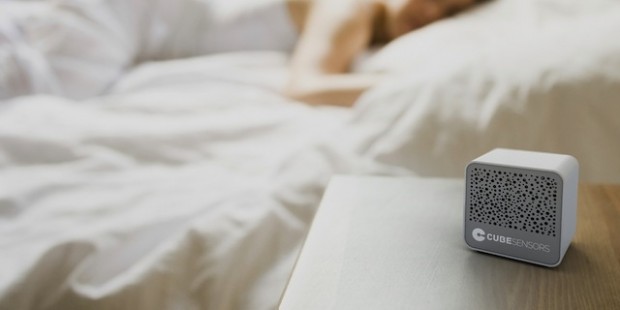
Those of us living in crowded cities, are all too familiar with air pollution caused outside by cars, trucks, factories and other common suspects. We like to think of our homes as a safe haven from all that nasty pollution. I hate to break it to you, but we might be wrong. Your indoor air quality might be up to ten times worse than outdoors, and you can thank (among other things) Volatile Organic Compounds (VOCs) for that.
VOCs are gases emitted from building materials, home and personal care products, even cooking and various hobbies. Even if you don’t smoke, don’t use a wood-burning stove and ventilate your home or office regularly, you might be hosting a variety of VOC emitting materials in your indoor spaces without realizing it. And while baking a fresh loaf of bread will emit pleasant smelling and non harmful VOCs, gases emitted from paints, carpets, cleaning products, copy machines, and other sources might not only small bad, but also cause adverse health effects.
Immediate health effects of VOCs can include eye, nose, and throat irritation; headaches, loss of coordination, nausea. And if all that wasn’t bad enough, repeated exposure to VOCs can also cause damage to hearth, liver, kidney, and central nervous system; even cancer in animals and potentially humans. While a strong smell will probably make it obvious for us to keep the windows open while painting, we can be exposed to VOCs without noticing it. In fact, you can’t always tell your VOCs just by smell.
And this is where CubeSensors step in. By keeping track of the amount of VOCs in the air, the Cubes can let you know if there’s something in your home or office that’s causing high levels of indoor air pollution. Studies have shown that removing the contaminants at the source is way more effective than relying on ventilation to remove air-borne VOCs. With a Cube in each room, you can be sure you’ll know exactly when indoor air pollution has increased. This will give you the opportunity to remove the offending object from your environment before it’s had the chance to expose you to harmful VOCs for a longer period of time.
Below you can see a sample test we’re currently running in different environments. The bedroom averages aren’t looking too good; the levels at the office seem better, but did somebody just bring a pizza in or is it time to take our organic trash out? Note that this is just a little sneak peak into how the Cubes will make your time spent indoors safer and healthier. The look of the app will probably change before the final release and we’ll make sure you also have smart alerts available, not just bare number.
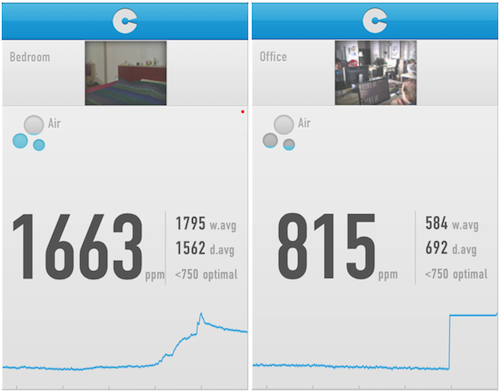
P.S.: But do keep in mind that the occasional increase in VOCs from baking delicious food or bringing in pizzas at the office is perfectly fine as long as you share it with you friends. Don’t worry about feeding the Cubes though, they run on rechargeable batteries.
Want to know even more about VOCs? We recommend these resources from some very smart people:

